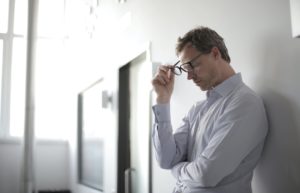 According to the Anxiety and Depression Association of America, 6.8 million adults suffer from a generalized anxiety disorder. Although everyone deals with some level of anxiety, many people experience symptoms that are more severe or frequent than others. While genetics, personality traits, temperament, and other issues can increase a person’s likeliness for developing the disorder, new research has found a direct connection between anxiety and sleep apnea in Topeka. Thankfully, combating your anxiety and getting the rest you need can be as simple as visiting your sleep dentist.
According to the Anxiety and Depression Association of America, 6.8 million adults suffer from a generalized anxiety disorder. Although everyone deals with some level of anxiety, many people experience symptoms that are more severe or frequent than others. While genetics, personality traits, temperament, and other issues can increase a person’s likeliness for developing the disorder, new research has found a direct connection between anxiety and sleep apnea in Topeka. Thankfully, combating your anxiety and getting the rest you need can be as simple as visiting your sleep dentist.
Sleep Apnea and Anxiety Connection
At least 22 million Americans have sleep apnea; however, as much as 80% of moderate-to-severe cases are undiagnosed. Sleep apnea is a condition that occurs when you stop breathing frequently throughout the night from an obstruction in the airway that’s caused by the soft tissues in the back of your mouth and throat collapsing. Although it’s often believed chronic snoring is the only concern of the sleep disorder, the symptoms of the condition can be quite diverse, which is one reason it is often misdiagnosed.
Among the many complications of untreated sleep apnea are depression and anxiety. In 2012, a European medical journal reported over 50% of people with sleep apnea also have anxiety and depression. Not to mention, sleep apnea can intensify symptoms of PTSD, like sleeplessness and nightmares.
Although there’s a direct connection between sleep apnea and anxiety, one condition doesn’t necessarily cause the other. It’s unclear if anxiety causes sleep disturbances or if interruptions in sleep cycles influence anxiety levels. Researchers have concluded both conditions can trigger one another.
When an interruption in breathing occurs, it sends a panic signal to the brain to wake up because your body is depleted of oxygen. Each time you awaken, your body is getting into “sleep debt,” which can make it more difficult for your brain to cope with stress. When your sleep is constantly disturbed, the neurochemicals in your brain are also altered to affect your thinking and mood patterns.
Treating Anxiety and Sleep Apnea
You have multiple options to stop pauses in breathing to get adequate rest, such as with a CPAP. The machine delivers a gentle stream of air pressure to keep the airway open. An oral appliance can be used as an alternative or in combination with a CPAP. The custom-fit device repositions the lower jaw to prevent the airway from being blocked. As a result, your body can get the rest it needs to function correctly. Not only will you safeguard your general health, but you’ll also notice an improved ability to handle daily stressors.
Don’t let sleep loss and anxiety impact your quality of life. Your sleep dentist in Topeka has the solution you need to feel your best.
About Dr. Michael E. Michel
Dr. Michel earned his dental degree at the University of Missouri-Kansas City School of Dentistry before continuing his training in sleep apnea. He offers noninvasive treatments for sleep apnea therapy, including oral appliances. Contact our office today to schedule your consultation.
